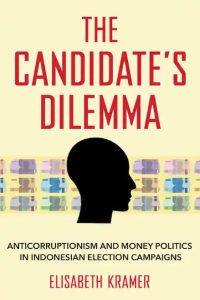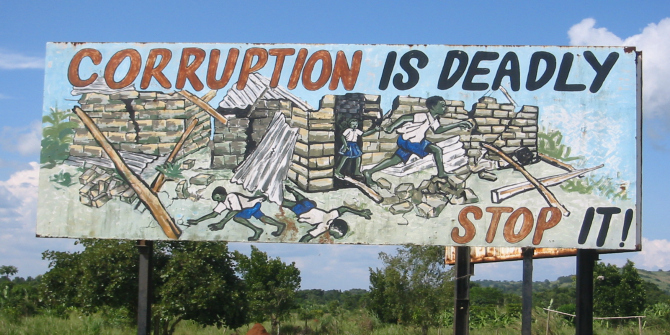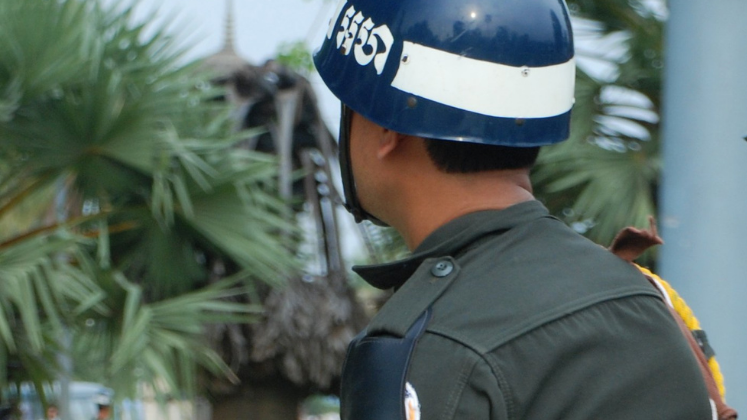In The Candidate’s Dilemma: Anticorruptionism and Money Politics in Indonesian Election Campaigns, Elisabeth Kramer presents the cases of three political candidates in the 2014 election who faced anticorruption dilemmas. Kramer skilfully marries strong storytelling with a rigorous analysis of Indonesia’s politics and shares lessons for the future of the country’s democracy, writes Ahmad Rizky M. Umar. This post was originally published on the LSE Southeast Asia Blog.
The Candidate’s Dilemma: Anticorruptionism and Money Politics in Indonesian Election Campaigns. Elisabeth Kramer. Cornell University Press. 2022.
 Indonesia has undergone a significant process of democratic reform and transition from authoritarian rule in the last two decades. After the end of the 32-year New Order authoritarian government in 1998, Indonesia embarked on a path of democratisation. The country reformed its political system, professionalised its military and judiciary, and ensured a free and clean election every five years. Ten years later, Indonesia is renowned as the world’s largest Muslim democracy and one of the examples of successful democratic transition in Asia.
Indonesia has undergone a significant process of democratic reform and transition from authoritarian rule in the last two decades. After the end of the 32-year New Order authoritarian government in 1998, Indonesia embarked on a path of democratisation. The country reformed its political system, professionalised its military and judiciary, and ensured a free and clean election every five years. Ten years later, Indonesia is renowned as the world’s largest Muslim democracy and one of the examples of successful democratic transition in Asia.
Despite these achievements, there remains a question: Does Indonesia’s quality of democracy reflect the praise that it has obtained abroad?
One of the main challenges that Indonesia still faces in domestic politics, and one that can threaten its democratic resilience, is the problem of corruption and money politics.
One of the main challenges that Indonesia still faces in domestic politics, and one that can threaten its democratic resilience, is the problem of corruption and money politics. Corruption has been a prevalent problem the country has faced since the New Order. Indeed, Indonesia has undergone a significant political reform that ensures checks and balances, law enforcement, and strong anticorruption laws and bodies. Indonesia has also reformed its political system to ensure competitive elections. But this competitive political system also results in a costly electoral process, which inevitably leads to another prevalent problem of money politics, or the distribution of huge amounts of money to voters –with various strategies—before the election.
The Candidate’s Dilemma offers a useful analysis of how Indonesia’s politicians deal with the twin problems of corruption and money politics in electoral campaigns
Elisabeth Kramer’s book, The Candidate’s Dilemma: Anticorruptionism and Money Politics in Indonesian Election Campaign (Cornell University Press, 2022), offers a useful analysis of how Indonesia’s politicians deal with the twin problems of corruption and money politics in electoral campaigns. Presenting three stories of Indonesian anticorruption politicians in the 2014 election, Kramer shows a political dilemma that every Indonesian politician faces: while adhering to anticorruption principles, a candidate competes in high-cost campaigns that are marked by money politics, which often forces them to sacrifice their anticorruption rhetoric before the altar of electoral politics.
Kramer elaborates on why and how this anticorruption dilemma occurs in an Indonesian election campaign. In Chapter 1, Kramer describes the landscape of Indonesia’s electoral politics after the New Order. While Indonesia successfully reformed the electoral system after 1998, particularly by encouraging competitive elections and a multi-party system, it did not sufficiently change campaign norms and behaviour, particularly those related to the mobilisation of resources and pragmatic engagement between candidates and voters. To win elections, parties and candidates have to convince voters to vote by offering something tangible for their own benefit. This has resulted in the prevalence of vote buying in the country, which shows the New Order’s legacies in Indonesian electoral politics.
The prevalence of vote buying in the election prompts several parties to campaign under an anticorruption narrative, which Kramer calls ‘anticorruptionism’. In Chapter 2, Kramer traces the origins of anticorruptionism to political reform after the New Order, where political activists campaigned to end KKN (Corruption, Collusion, and Nepotism), which was prevalent during the New Order. Nevertheless, despite election promises by newly elected President Susilo Bambang Yudhoyono to combat corruption, the problem of corruption still haunted Indonesia’s politics. This culminated in multiple scandals faced by the ruling Democratic Party at the end of Yudhoyono presidency. In addition, Yudhoyono’s presidency also failed to curb vote buying in Indonesian elections, which left money politics even more prevalent at the end of his presidential term.
The result of […] half-heartened anticorruption reform is the candidate’s dilemma to combat corruption and money politics under a costly and highly competitive election.
The result of this half-heartened anticorruption reform is the candidate’s dilemma to combat corruption and money politics under a costly and highly competitive election. In the three remaining chapters, Kramer presents three stories of Indonesia’s anticorruption activists-turn-politicians who face this dilemma and deal with the dilemma. The first story of Ambo, a staunch anticorruption politician from South Sulawesi, shows a rare ‘success’ story of a candidate embracing anticorruptionism despite competitive rivalries and a difficult path to secure his own seat. The election, indeed, involved money politics. But against all odds, Ambo was able to secure the seat without vote buying. This achievement was not without a price. He had to convince voters and use his personal resources for the election, which resulted in a reduced majority in his own district.
The two other stories are less upbeat. Ayu, a middle-class activist from Jakarta who fought for a seat in East Java, was forced to ‘bow to the pressure’ to use money politics in her campaign. In this case, Ayu not only bowed to the pressure of money politics but also failed to secure the seat despite her close connection with the Party’s Chairman. Ayu’s story shows a visible dilemma for politicians in dealing with money politics, which resulted in disappointment when the candidate lost the election. Another story about Bontor, an anticorruption activist from North Sumatra, shows a pragmatic strategy to maintain anticorruption commitment by combining it with ethnic and religious privilege. Bontor pragmatically used his status as Batak elder and the culture of ‘gift-giving’ as another means to secure votes. This pragmatic strategy illustrates the intersection between culture and corruption in Indonesian campaigns that also strengthens the anticorruption dilemma.
The strength of the book lies in its storytelling ability without losing the rigour to understand Indonesian politics in general.
Kramer’s book ultimately presents us with different stories of anticorruption dilemmas. The strength of the book lies in its storytelling ability without losing the rigour to understand Indonesian politics in general. Kramer skilfully provides the lessons that we can learn for Indonesia’s democracy. For democracy to be resilient and powerful, tackling the problem of corruption, money politics, and costly electoral campaigns is important. Kramer’s book provides us with a warning of further decline in Indonesia’s democracy if the problem of money politics cannot be dealt with.
According to political scientist Burhanuddin Muhtadi, money politics always involves complex strategies and personnel at the grass-roots level, which constrains meaningful voter engagement.
But there is also another question: can candidates actually resolve this anticorruption dilemma? Kramer argues in Chapter 6 that reducing the cost of elections and voters’ engagement is necessary to tackle the anticorruption dilemma. This is an important suggestion, but the dilemma is not simply about choosing money politics over other campaign strategies. According to political scientist Burhanuddin Muhtadi, money politics always involves complex strategies and personnel at the grass-roots level, which constrains meaningful voter engagement. The story of Bontor shows that a costly electoral process means that candidates are forced to resort to cultural practices that often perpetuate demands for money politics.
Thus, tackling the anticorruption dilemma requires analysis beyond the electoral campaign. In this case, linking voters’ engagement with broader anticorruption activism after the election will strengthen Kramer’s arguments. Hence, a more comprehensive assessment of the relationship between money politics and anticorruption also enables further analysis of the future of Indonesia’s democracy in general, as Kramer has eloquently elaborated in the conclusion of the book. Notwithstanding, this book is still an important one for students of Indonesian politics.
This book review is published by the LSE Southeast Asia blog and LSE Review of Books blog as part of a collaborative series focusing on timely and important social science books from and about Southeast Asia. This review gives the views of the author, and not the position of the LSE Review of Books blog, the LSE Southeast Asia Blog, or the London School of Economics and Political Science.
Main Image Credit: Rafli Firmansyah on Unsplash.








2 Comments